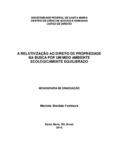| dc.contributor.advisor | Tybusch, Jerônimo Siqueira | |
| dc.creator | Fontoura, Marcelo Elesbão | |
| dc.date.accessioned | 2017-08-21T17:06:25Z | |
| dc.date.available | 2017-08-21T17:06:25Z | |
| dc.date.issued | 2015-12-01 | |
| dc.date.submitted | 2015 | |
| dc.identifier.uri | http://repositorio.ufsm.br/handle/1/11486 | |
| dc.description | Trabalho de conclusão de curso (graduação) - Universidade Federal de Santa Maria, Centro de Ciências Sociais e Humanas, Curso de Direito, RS, 2015. | por |
| dc.description.abstract | The following monograph aims at demonstrating the interrelation between the limitation of the property right imposed by the accomplishment of a social and environmental function and the preservation of the urban environment. The property right, ensured as a fundamental right since the liberal constitutions from the XIX century, has suffered changes along the years. Such changes are about, mainly, the non-legitimation that legal system guaranteed when exploring the property unlimitedly, which, nowadays, must be subordinated to a social and environmental function. Thus, the evolution of Environmental Law in Brazil and around the world, emphasized in the second half of the XX century and boosted by the preoccupation of the organizations with the environment ecologically balanced, had a leadership with the rising to fundamental right by the Citizen Constitution of 1998. Then, the Environmental Law assumed a landing of third generation law. The guardianship of the environmental good was added to the social function of the property, ensuring that the property accomplishes a social environmental function, destined to the suitable use of collectivity questions, promoting the social justice. The social environmental function must serve as a parameter to the exploration of property. Besides that, in case of necessity, it must assume its role, which is a leading role, revitalizing the property to ensure the environmental preservation. The re-reading of property right, through the Environmental Law eyes gave it a new format, guided by the comprehension that its exercise it is not absolute and irrevocable anymore, considering that, the environment and the public interest prevail upon the individual one. Searching for the effectiveness of the social environmental function in relation to the urban property, constitutional instruments of urban politics has emerged. Such instruments, applied to the property, must be used considering the social environmental function, ensuring an environment ecologically balanced to the present and future generations. Considering the bibliographic nature of this research, the systemic complex theory was the method of approach used, whit interface among law, politics, ecology, science and culture. | eng |
| dc.language | por | por |
| dc.publisher | Universidade Federal de Santa Maria | por |
| dc.rights | Acesso Aberto | por |
| dc.subject | Environmental law | por |
| dc.subject | Função socioambiental da propriedade | por |
| dc.subject | Direito ambiental | por |
| dc.subject | Direito à propriedade | por |
| dc.subject | Meio ambiente ecologicamente equilibrado | por |
| dc.subject | Social environmental function of property | por |
| dc.subject | Right to property | por |
| dc.subject | Ecologically balanced environment | por |
| dc.title | A relativização ao direito de propriedade na busca por um meio ambiente ecologicamente equilibrado | por |
| dc.title.alternative | The relativization to the right of property searching for na ecologically balanced environment | eng |
| dc.type | Trabalho de Conclusão de Curso de Graduação | por |
| dc.degree.local | Santa Maria, RS, Brasil | por |
| dc.degree.graduation | Direito | por |
| dc.description.resumo | A presente monografia tem por finalidade demonstrar a inter-relação entre a limitação do direito à propriedade imposta pelo cumprimento a uma função socioambiental e a preservação do meio ambiente urbano. O direito de propriedade, assegurado como direito fundamental desde as Constituições liberais do século XIX, com o passar dos anos sofreu modificações, principalmente pela não mais legitimação que o ordenamento jurídico conferia em explorar a propriedade ilimitadamente, a qual, atualmente, deve estar subordinada a uma função socioambiental. Do mesmo modo, a evolução do Direito Ambiental no Brasil e no mundo, com ênfase à segunda metade do século XX, impulsionada pela preocupação das Organizações com o meio ambiente ecologicamente equilibrado, obteve protagonismo com a elevação a direito fundamental pela Constituição Cidadã de 1988, assumindo patamar de direito de terceira geração. A tutela do bem ambiental foi agregada à função social da propriedade, assegurando com que a propriedade cumpra uma função socioambiental, destinada ao uso condizente com as questões da coletividade, promovendo a justiça social. Função socioambiental que deve servir de parâmetro para a exploração da propriedade, e havendo necessidade, assumir seu papel que é de destaque, relativizando-a para assegurar a preservação ambiental. A releitura do direito de propriedade, através da lente do Direito Ambiental, conferiu-lhe novo formato, orientado pelo entendimento que o seu exercício não mais se apresenta absoluto e inderrogável, tendo em vista que o meio ambiente e o interesse público prevalecem sobre o individual. Em busca da efetividade da função socioambiental relativa à propriedade urbana, surgem instrumentos constitucionais de política urbana, aplicados sobre a propriedade, que deverá ser utilizada respeitando sua função socioambiental, assegurando um meio ambiente ecologicamente equilibrado para as presentes e futuras gerações. Considerando-se que o trabalho é de natureza bibliográfica, o método de abordagem utilizou a teoria sistêmico-complexa, com interface entre direito, política, ecologia, ciência e cultura. | por |
| dc.publisher.country | Brasil | por |
| dc.publisher.initials | UFSM | por |
| dc.subject.cnpq | CNPQ::CIENCIAS SOCIAIS APLICADAS::DIREITO | por |
| dc.publisher.unidade | Centro de Ciências Sociais e Humanas | por |


